Is your DNA test revealing the whole truth or just pieces of a bigger puzzle? Are the results definitive, or just probabilities? Can they accurately determine health risks or ancestry? Interpreting DNA test results requires more than just reading the data. Health-related findings indicate potential risks, not certainties, while ancestry estimates evolve as databases expand. Environmental and lifestyle factors also play a vital role in how DNA findings translate into real-world outcomes. A deeper understanding of these results is crucial for making informed decisions. Let’s explore what your DNA truly reveals— and what it doesn’t.
DNA reports provide detailed insights based on genetic testing, helping individuals understand their ancestry, health, or biological relationships.
The type of report generated depends on the test conducted and the specific genetic information analyzed.
Ancestry DNA reports reveal a person’s genetic heritage by tracing lineage through unique genetic markers.
These reports often break down ethnic origins, migration patterns, and genetic connections to different populations worldwide.
Certain ancestry reports identify potential relatives by matching DNA with global databases.
DNA health reports examine genetic material to identify the risk of inherited conditions, genetic disorders, and susceptibility to diseases like heart disease, diabetes, or cancer.
They aid in proactive healthcare planning, lifestyle modifications, and early detection of potential risks.
Some tests also offer insights into how an individual’s body may react to certain medications, helping create personalized treatment plans.
A paternity DNA test precisely establishes whether a man is the biological father of a child.
These reports are often used for legal, medical, or personal reasons and provide conclusive evidence regarding parental identity.
Some tests go beyond paternity, studying siblingship, grand-parentage, and other biological relationships.
Interpreting a DNA test report requires understanding key elements such as loci (plural of locus, meaning specific regions on chromosomes), alleles, and probability of relationship.
Each individual has two alleles at each locus, inherited from their parents.
These alleles are represented by numbers indicating their size.
In a paternity test, the child must have one matching allele from the alleged father at each tested locus.
The alleged father is excluded as the biological parent if a mismatch is found in multiple loci.
Another critical section of the report is the relationship index, which quantifies the statistical likelihood of a biological relationship.
The combined relationship index, calculated from all tested loci, determines the probability of the relationship, expressed as a percentage.
A result above 99.9% typically confirms paternity, while a 0% result indicates exclusion.
Additionally, the amelogenin marker confirms the gender of the tested individuals.
Understanding these factors helps accurately interpret the DNA test results and determine the biological relationship with certainty.
Traits are the characteristics that define individuals and are influenced by genetic and environmental factors.
In genetics, traits are studied to understand how DNA variations affect individuals.
These can be physical (like eye color or height) or behavioral (like sleep patterns).
A Single Nucleotide Polymorphism (SNP) is a slight genetic variation that may influence traits.
Each SNP has a unique rsID (Reference SNP cluster ID) in the dbSNP database, allowing researchers to explore genetic differences and their connection to traits and health.
Multiple reports are merged under one rsID for consistency if they identify the same SNP.
If a genetic marker lacks a rsID, it may be assigned an internal ID (e.g., “i” followed by a number).
These are often used in custom research but may not be referenced in public genetic databases.
RSIDs are crucial in genetics as they help identify how DNA variations shape traits and influence health.
DNA test results offer valuable insights into inherited health risks, but they do not determine with certainty whether a condition will develop.
Instead, they indicate different levels of genetic risk, helping individuals make informed health decisions.
A positive result means a significant genetic mutation was found, increasing the likelihood of developing a hereditary condition.
However, this does not mean the condition is sure to occur. Lifestyle choices, environmental influences, and medical history also impact overall risk.
A positive result may lead to proactive health measures like regular screenings, lifestyle modifications, or preventive treatments.
Since many genetic conditions are inherited, family members may consider genetic testing to better understand their risks.
A moderate-risk result might indicate the presence of a 'variant of uncertain significance' (VUS).
This outcome means there's a genetic change without enough data to determine if it increases risk.
VUS are most often reclassified as benign (not increasing risk) and are not used to make immediate healthcare decisions.
A negative result means no known genetic variants associated with a specific condition were detected.
While this can be reassuring, it isn’t a lifelong guarantee.
Some conditions may still arise due to undiscovered genetic variants or other non-genetic factors.
A negative result should not replace routine health checkups and screenings, as medical advancements may reveal new genetic links in the future.
Health recommendations in your DNA report should be used as a guide, not a final diagnosis.
If a high-risk condition is identified, it is essential to follow suggested lifestyle adjustments, regular screenings, or preventive treatments.
However, major health decisions should always be made in consultation with a doctor.
Genetics alone does not determine health, as lifestyle, environment, and medical history also matter.
Staying proactive with regular checkups ensures you take the proper steps for your well-being.
Receiving your DNA test results is step one.
Understanding them and taking appropriate action can help you make informed health decisions.
Your DNA report may include specific lifestyle and health recommendations based on your genetic predispositions.
These could relate to diet, exercise, disease risk, or medication responses.
While these insights can be helpful, they should not be taken as definitive medical advice.
Genetics influence health, but other key factors like lifestyle, environment, and medical background matter too.
Use the recommendations as a guideline and consult a professional before making major health decisions based on your report.
It's essential to discuss your DNA test results with a healthcare professional, especially if they indicate a high/moderate risk for a condition.
A doctor can help interpret the findings in the context of your overall health, clarify what they mean for you, and suggest appropriate medical screenings or lifestyle changes.
They can also help distinguish between actionable information and genetic variations that may not require immediate concern.
Genetic counselors interpret DNA reports, explain potential risks, and guide individuals on the next steps.
A genetic counselor could help explain the complex aspects of your report, such as uncertain genetic variants or your risk for hereditary conditions.
They can also help assess whether family members should consider testing and provide emotional support for dealing with unexpected or concerning results.
Several companies offer at-home DNA testing kits, helping you explore your genetic makeup.
Popular choices include 23andMe, AncestryDNA, and MyHeritage DNA.
Once you receive raw DNA data from these providers, the next step is unlocking its full potential.
Many wonder where to get affordable, fast, and reliable insights from their existing data, and that's where Xcode Life stands out.
Why Xcode Life?
Upload your raw DNA data to Xcode Life and select the reports you need- no extra testing required!
Explore our report suite here.
A DNA paternity test provides a clear result, showing either 0% or 99.9% probability of paternity.
A 0% result confirms that the tested man has no genetic match with the child, proving he is not the biological father.
This outcome is definitive and leaves no doubt about non-paternity.
Genetic tests can offer valuable insights, but they do have limitations.
They are designed to identify common genetic variations but may not capture rare mutations that could play a role in certain conditions.
These tests also cannot detect diseases caused by environmental factors, infections, or random events.
While they may reveal genetic predispositions, they cannot predict whether symptoms will develop, their severity, or the progression of a condition.
Additionally, many genetic disorders, even when identified, currently have no effective treatments.
Therefore, genetic testing is a valuable tool but not a substitute for a comprehensive understanding of health risks.
A locus is a particular location on a chromosome that carries a specific gene or genetic marker, similar to an address within your genome.
DNA tests analyze genetic variations at multiple loci to determine relationships (like paternity), ancestry, and risk for inherited traits or diseases.
Each locus typically has two alleles, one inherited from each parent. If both alleles at a locus are identical, the test may display a single value instead of two.
For paternity testing, a potential father must share at least one allele with the child at each tested locus to be considered the biological father.
DNA testing is generally highly accurate, particularly for applications like paternity testing, where reliability rates often exceed 99.9%.
Modern techniques like Next-generation sequencing (NGS) deliver precise results for various DNA tests, including ancestry, health risk, and paternity analysis.
However, accuracy can differ depending on sample quality, lab standards, and the specific DNA test.
Choosing a reputable and accredited provider is crucial for obtaining reliable results.

The Future Of Genetic Testing: Emerging Trends And Innovations
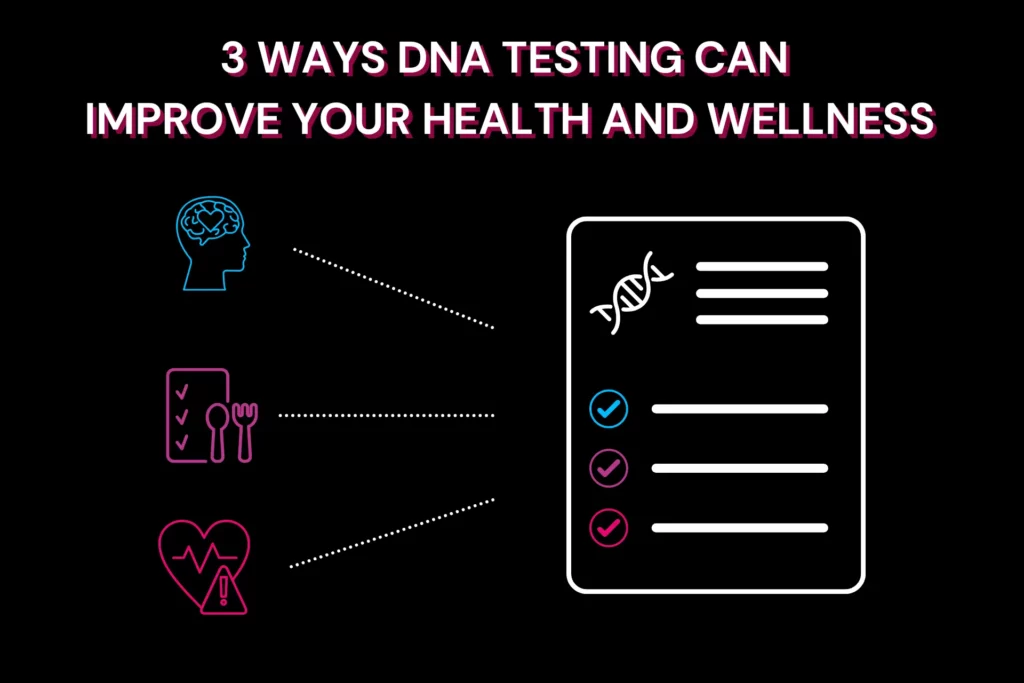
3 Ways DNA Testing Can Improve Your Health And Wellness

Genetic Markers Explained
https://www.apollohospitals.com/diagnostics-investigations/dna-test
https://www.ibdna.com/resources/understand-your-results/
https://www.mdpi.com/2673-6756/4/4/33
https://www.genome.gov/genetics-glossary/Trait
https://customercare.23andme.com/hc/en-us/articles/212196908-What-Are-RS-Numbers-Rsid
https://www.xcode.life/dna-reports/
https://my.clevelandclinic.org/health/diagnostics/10119-dna-paternity-test
https://www.nature.com/scitable/topicpage/paternity-testing-blood-types-and-dna-374
Early to bed and early to rise makes a man healthy, wealthy, and wise– a proverb we've heard for years. But what if many people may simply not be programmed to wake up early? Whether you are a morning or evening person depends mainly on your genetics, which governs your circadian system. If it's genetic, can you test for circadian identity with 23andMe? Let’s learn more about circadian rhythm (the body’s sleep-wake cycle) and how it determines your chronotype (when you wake up).
Circadian rhythm is the physical, mental, and behavioral changes an organism undergoes over a 24-hour cycle.
In addition to light and darkness, other factors, such as diet, stress, physical activity, and temperature, influence the circadian rhythm.
Different species have their circadian rhythms.
Did you know that every organ and tissue in the human body has its own circadian rhythm?
Circadian rhythms are essential as they govern different physiological functions in the body:
People who start their day earlier and are more active during the day are called 'morning larks'.
Conversely, 'night owls' is the term for those who start their day later and remain active in the latter half of the day.
The circadian rhythm governs the body’s sleep cycle by responding to light changes in the environment.
However, an individual’s preference of being a night owl or a morning lark isn’t entirely in their control.
The reason? It's in their genes!
Circadian rhythms are driven by an internal timing system regulated by different genes.
There is a gene network that oscillates within a 24-hour cycle.
In this gene network, clock genes exist that control physiology and behavior.
Your chronotype is coded into your genes.
If you feel like you might be a morning person, it's likely a genetic outcome.
A 2019 study published in Nature identified 351 genetic factors associated with the circadian rhythm.
In addition to the body’s sleep-wake cycle, these genes also influence other aspects of the individual's health, such as mental health, memory, cognitive abilities, and overall health.
Yes, some people are naturally nocturnal, which means they are biologically programmed to be more active during the night.
These individuals, also called late sleepers, prefer to stay up during the night and wake up later in the morning.
Here’s how 23andMe determines wake time!
When predicting your wake-up time, 23andMe follows the following steps-
To get your circadian identity by 23andMe, here are the steps:
Many people turn out to be night owls, thanks to their genes.
According to research, people stick to the sleep timings that suit them best, and this preference is genetic.
Forcing people to choose a waking time far from their natural preference can be harmful.
Additionally, some studies suggest both morning people and night owls could be equally healthy, wealthy, and wise.
The current human species is the Homo sapiens sapiens.
According to a study published in Smithsonian Magazine, people who inherited the Neanderthal-derived genetic changes may be early risers.
So, if you are an early riser, you may have inherited the gene from a Neanderthal ancestor.
23andMe emphasizes the influence of genes on the circadian identity of an individual.
While it does consider non-genetic factors like age and sex, several other factors influence one’s circadian rhythm.
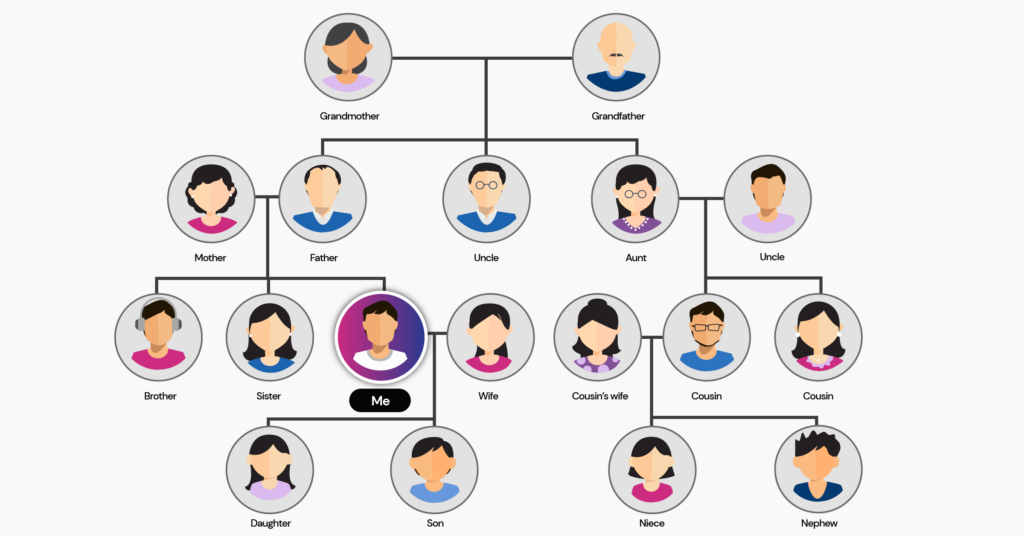
How to Use 23andMe Family Tree: A Step-by-Step Guide for Beginners
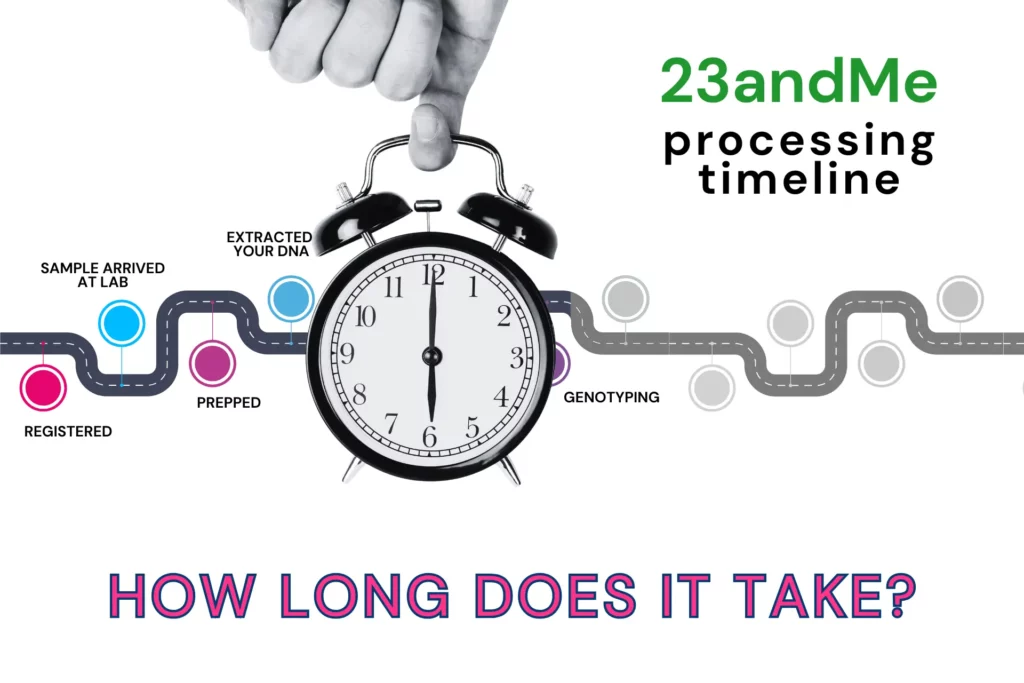
How Long Does 23andMe Take?
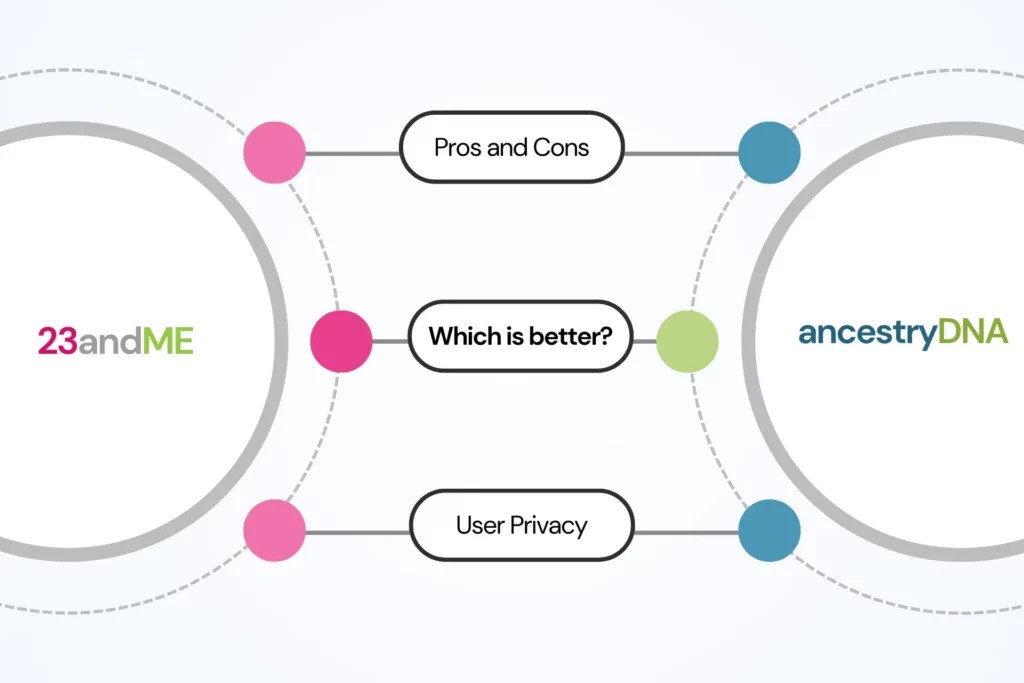
Comparing AncestryDNA vs 23andMe For Raw Data Analysis: Which Is Better?
https://www.23andme.com/topics/traits/wake-up-time
https://blog.23andme.com/articles/morning-person
https://www.nature.com/articles/s41467-018-08259-7
https://www.nature.com/articles/ncomms10448
https://pmc.ncbi.nlm.nih.gov/articles/PMC6084759
Imagine a world where doctors prevent diseases before they start, rewrite faulty genes, and customize medications to your DNA. This isn’t science fiction—it’s the future of genetic testing. Genetic testing is transforming how we understand ourselves, unlocking the secrets of our DNA. From detecting inherited diseases to personalizing treatments, it’s reshaping healthcare. As science advances, we must navigate its promises, possibilities, and ethical dilemmas too.
From basic biological tools to advanced genetic sequencing, human identification has come a long way.
Before DNA testing, scientists relied on methods like blood typing and serological testing, which could indicate relationships but lacked precision.
The evolution of DNA analysis has transformed forensic science, paternity testing, and ancestry research.
Early methods: Blood typing, serological analysis, and HLA testing (1920s–1970s)
The NGS revolution (2010s- present)
Next-generation sequencing (NGS) has revolutionized DNA testing, enabling high-precision sequencing and expanding its applications.
A key development made possible by NGS is a safer, more straightforward alternative to paternity testing.
Non-invasive prenatal paternity (NIPP) testing can analyze a maternal blood sample as early as 7 weeks into pregnancy.
Currently, DNA testing is extensively employed in various fields, including forensics and paternity testing.
It helps solve criminal cases by matching DNA evidence from crime scenes to suspects.
In paternity cases, it helps confirm biological relationships between fathers and children.
Beyond forensics, DNA testing is used in medical areas like bone marrow and organ transplants.
It helps doctors check if a transplant is successful and if the body accepts the new cells or organs.
DNA tests can also identify the origin of tumors after a transplant, determining whether they are from the donor or the recipient.
DNA testing uses advanced techniques like PCR (to make copies of DNA), DNA sequencing (to determine the exact sequence), and STR analysis (to create unique DNA profiles).
These methods enable accurate and efficient DNA analysis for various applications. The article also discusses the several technologies involved.
DNA testing accuracy today is remarkably high, reaching up to 99.99%.
The accuracy depends on the number and quality of genetic markers analyzed during the test.
Technological advances have also improved DNA testing’s ability to work with smaller or degraded samples while maintaining high precision.
A DNA test looks at your genetic makeup to identify changes in your genes, chromosomes, and proteins. It helps detect genetic conditions or risks, such as:
The decision to take a DNA test is personal and should be discussed with a genetic counselor or geneticist, as it has both benefits and limitations.
DNA testing is becoming more accessible, with varying costs depending on the type of test and purpose:
Ongoing developments in DNA testing are enhancing capabilities in health, ancestry, and forensic science, with the latest techniques outlined below:
Karyotyping analyzes chromosome number and structure, while FISH uses fluorescent probes to identify specific DNA sequences.
It examines all chromosomes simultaneously, detecting changes smaller than those identified by karyotyping or FISH.
The future of genetic testing looks very promising and is set to change how we treat medical conditions.
With ongoing advancements, genetic testing will soon replace traditional methods of prognosis prediction, enabling more precise and personalized treatment plans.
One of the most exciting possibilities is creating customized treatments for patients who are most likely to benefit, reducing unnecessary therapies and improving results.
As technology advances, genetic testing will help detect more disorders and give us a better understanding of complex diseases, like various forms of cancer.
Researchers are also progressing in mapping genetic variations that could provide crucial insights for future therapies.
This progress will help guide the next generation of clinical research, offering hope for more effective solutions and improved patient care.
DNA testing is constantly evolving, and it’s important to match this pace.
Accessibility is the key to meaningful innovation, and this is where Xcode shines.
Xcode is currently able to accurately and comprehensively analyze genetic data from over 50 raw DNA data providers.
We deliver some of the most affordable DNA reports on the market within just 24 hours of ordering.
Xcode’s blog is regularly updated with informative, engaging articles on the latest scientific trends.
This reflects our dedication to innovation as well as universal accessibility in the field of genetic testing.
The adoption of genetic testing has significantly increased, particularly over the last two decades.
The number of genetic tests registered in the United States has grown dramatically, with 129,624 tests listed as of November 2022.
Globally, the number is even higher, reaching 197,779 tests.
This growth is primarily driven by clinical tests, with over 90% of tests used for diagnostic purposes.
The number of new genetic tests made available yearly has also grown, from 607 new tests in the US in 2012 to 3,097 in 2022.
On a global scale, new genetic tests grew from 1,081 in 2012 to 6,214 in 2022.
Most of these tests aim to diagnose conditions rather than research, demonstrating the growing role of genetic testing in healthcare.
Even though genetic testing holds significant value for understanding genetic conditions, many people choose to decline.
The following are some key reasons why:
We are making significant progress towards gene editing, with CRISPR-Cas9 technology leading the way.
This system enables scientists to edit DNA with great accuracy, and it has already been applied to plants, animals, and human cells in research.
The ability to use gene editing to eliminate or treat genetic diseases, such as sickle cell anemia and cystic fibrosis, is within reach.
Right now, gene editing is mainly used for research, but there is potential for it to be used in clinical treatments in the future.
Specifically, it could prevent genetic disorders from being passed to future generations.
While gene editing is not yet a routine part of medical treatments, its rapid development suggests it could soon play a key role in fighting genetic diseases.

3 Ways DNA Testing Can Improve Your Health And Wellness

Genetic Markers Explained

Genes vs. Lifestyle: Striking The Right Balance
https://dnacenter.com/history-of-dna-testing
https://pmc.ncbi.nlm.nih.gov/articles/PMC1200713
https://www.nature.com/scitable/topicpage/paternity-testing-blood-types-and-dna-374
https://medlineplus.gov/genetics/understanding/testing/genetictesting
https://dnacenter.com/blog/how-much-does-a-dna-test-cost
https://pmc.ncbi.nlm.nih.gov/articles/PMC10376292
https://cellandbioscience.biomedcentral.com/articles/10.1186/s13578-019-0314-y
https://www.sciencedirect.com/science/article/abs/pii/S0379073819302014
https://medlineplus.gov/genetics/understanding/genomicresearch/snp
https://pmc.ncbi.nlm.nih.gov/articles/PMC6976916
https://www.mdpi.com/2227-9040/6/4/43
https://pmc.ncbi.nlm.nih.gov/articles/PMC6240714
https://www.nature.com/articles/s41551-021-00760-7
https://www.testing.com/genetic-testing-techniques/
https://pmc.ncbi.nlm.nih.gov/articles/PMC10142561
https://pmc.ncbi.nlm.nih.gov/articles/PMC6119550
https://pmc.ncbi.nlm.nih.gov/articles/PMC5524257
DNA testing is rapidly changing the way we approach our health. It provides deep insights into our genetic makeup, opening doors to understanding risks for conditions like heart disease, diabetes, and cancer, long before symptoms emerge. Research suggests that 80% of chronic diseases are preventable with the proper knowledge and lifestyle changes. What if DNA testing could provide the exact information needed to personalize your health strategies? The potential benefits are vast, from enhancing your diet to managing mental health. Keep reading to discover three ways DNA testing can improve your health.
The healthcare system faces several key limitations that affect patient care.
Here are some of the significant challenges:
DNA testing provides essential information in several areas, from health to family connections, making it a vital tool for addressing key issues today, such as:
DNA testing has evolved beyond ancestry research and is now a valuable tool for improving health.
Here are three ways DNA testing can enhance your health:
DNA testing reveals how your body processes nutrients, reacts to specific foods, and metabolizes fats, carbs, and proteins.
For example, it may show if you're predisposed to lactose intolerance, gluten sensitivity, or how you metabolize caffeine.
This information allows you to adjust your diet to meet your body's needs, leading to better digestion, energy, and overall health.
DNA tests highlight your genetic risk for conditions like heart disease, diabetes, or certain cancers.
While these results don't guarantee you'll develop these conditions, they enable you to take proactive measures.
For instance, if you're more prone to heart disease, exercising regularly, eating a heart-healthy diet, and scheduling routine check-ups can be practical steps.
DNA testing provides valuable information on genetic factors that affect mental health.
Some tests analyze genes associated with conditions like depression, anxiety, or ADHD.
Knowing your genetic predisposition helps develop a personalized mental health plan with therapy, lifestyle changes, or treatments.
Note: Always consult a doctor to interpret your DNA test results and create a personalized health plan based on your genetic profile.
DNA testing is now considered highly accurate, with reputable companies reporting reliability rates exceeding 99.9%.
Despite this accuracy, privacy remains a significant concern, as genetic data may be vulnerable to unauthorized access if not securely stored after submission.
Even with security measures like encryption, your genetic information remains vulnerable.
It could be shared without your consent with entities like research institutions or pharmaceutical companies.
Protecting your privacy can involve choosing providers with strong data privacy policies, being mindful of how your data is utilized, and minimizing data sharing.
Since genetic data cannot be changed like a password, users must carefully consider the long-term implications before undergoing DNA testing.
You can get a DNA test from several places:
The rising cost of healthcare is a big concern for people, governments, and employers.
Expensive treatments, medicines, and administrative costs make it harder to afford care and increase health inequalities.
One primary reason for these high costs is inefficiency in healthcare systems.
Many tasks, such as insurance claims, patient billing, and record management, still require manual work. This slows things down and raises expenses.
Additionally, healthcare relies on unstructured data, which makes it challenging to analyze and use information appropriately.
These inefficiencies worsen other problems, such as limited access to care, managing long-term illnesses, and meeting the needs of an aging population.
DNA testing has several downsides, including:
According to a systematic review, whole-exome sequencing (WES) costs between $555 and $5,169, while whole-genome sequencing (WGS) costs between $1,906 and $24,810.
These estimates vary based on laboratory fees, sequencing depth, data interpretation, and whether clinical consultations are included.
The review also found that many cost analyses lack transparency, making it unclear which components are covered.
While WES and WGS can potentially improve genetic diagnosis, more research is needed to evaluate their cost-effectiveness in clinical practice.
While genetic tests provide valuable insights, they do not offer a complete picture of health or future risks.
They mainly identify common genetic variations but may miss rare ones contributing to certain conditions.
Genetic testing cannot detect diseases influenced by environmental factors, infections, or random events.
These tests also cannot confirm whether someone will develop symptoms of a disorder, how severe it will be, or how it may progress.
Additionally, many genetic disorders have no effective treatment, even if identified.

Genetic Markers Explained
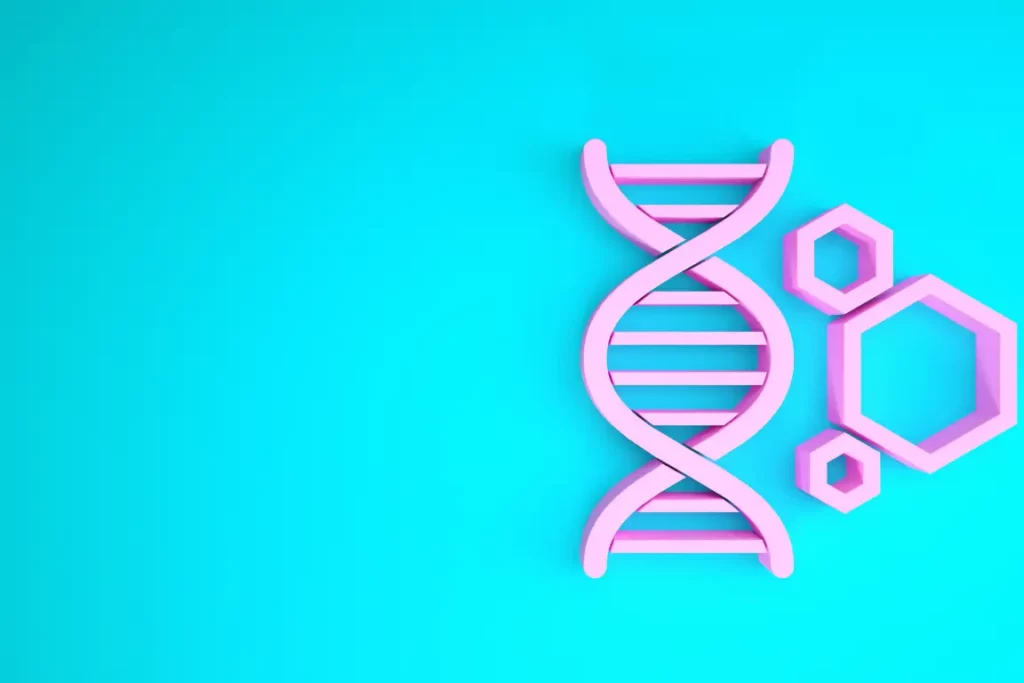
What Are RSIDs?

Genes vs. Lifestyle: Striking The Right Balance
https://pubmed.ncbi.nlm.nih.gov/28523941
https://www.ncbi.nlm.nih.gov/books/NBK221522
https://www.apollohospitals.com/diagnostics-investigations/dna-test
https://www.nhlbi.nih.gov/health/cystic-fibrosis
https://www.mayoclinic.org/diseases-conditions/tay-sachs-disease/symptoms-causes/syc-20378190
https://www.bda.uk.com/resource/dietary-dna-tests-how-they-work-and-what-theyre-useful-for.html
https://www.hudsonalpha.org/understanding-genetic-risk-how-genetics-shape-your-health
https://pmc.ncbi.nlm.nih.gov/articles/PMC9840515
https://www.cdc.gov/adhd/about/index.html
https://www.kff.org/health-costs/issue-brief/americans-challenges-with-health-care-costs/
https://www.nature.com/articles/gim2017247
https://medlineplus.gov/genetics/understanding/testing/riskslimitations
https://my.clevelandclinic.org/health/diseases/21751-genetic-disorders
In a room of 25 people, chances are, only two people are likely to be left-handers. Handedness is the preference for one hand over the other for everyday tasks like eating or writing. There are three types of handedness – Left-handedness, right-handedness, and mixed-handedness (an equal preference for either hand). Data collection studies say that about 12% of the world’s population is left-handed, and about 1% is mixed-handed. Biologically, handedness could have a link to the coordination and function of your brain's right and left hemispheres. This article will explore the genetics behind handedness and why there are so many more right-handers than left-handers.
Handedness refers to an individual’s preference to use one hand (called the dominant hand) over the other for tasks like writing, eating, cutting with scissors, etc.
Globally, more than 85% of people are right-handed.
Left-handedness is a fairly rare trait with a prevalence of under 15%.
Mixed-handedness is defined as preferring different hands for different tasks, and ambidextrousness is the ability to perform tasks equally well with either hand.
The widespread prevalence of right-handedness suggests that it could be beneficial but also begs the question of how left-handedness originated.
Typically, the left and right hemispheres of the brain handle different activities.
For example, the left hemisphere is the language center and is responsible for formulating grammar and vocabulary.
The right hemisphere is involved more with visual processing and spatial sense.
Michael Corballis, PhD, a psychologist at the University of Auckland in New Zealand and a brain hemisphere specialist, mentioned to APA - “There's an advantage to cerebral dominance because it localizes function to one hemisphere; otherwise, information has to cross back and forth across the corpus callosum, and that can sometimes cause problems."
It is suggested that during early development, small variations—due to genetics, hormones, or even random "developmental noise"—can influence how the brain organizes itself.
For some people, these variations lead to a preference for using the left hand.
Twin and family studies suggest that genetics plays a role in handedness.
They report that up to 40 genes could lead to handedness through common genetic influence.
Their effect on handedness is cumulative; no single gene decides handedness.
Each of these genes exerts a small and weak influence, but together play a big role in hand preference.
Scientists have only identified a few of these genes.
One gene of interest is NME7 (NME/NM23 Family Member 7).
This gene regulates the position of organs along the left/right axis of the body.
It likely plays a role in body symmetry and your tendency to prefer your left hand.
Left-handedness persists as a minority trait in human populations due to a combination of genetic, neurological, evolutionary, and cultural factors.
Left-handedness has links to increased risks for some health conditions.
However, the strength of evidence and validity of some findings remain dubious.
Here are some key findings from scientific studies:
Inflammatory bowel disease: Left-handers have a 2x higher risk of developing Crohn’s disease or ulcerative colitis.
Cardiovascular disorders (CVD): A 2023 study by the Medical College of Georgia reported that vascular endothelial function and heart rate variability are lower in southpaws than in right-handers. This supports the increased risk of CVD in left-handers.
Breast cancer: Postmenopausal left-handed women have a higher incidence, possibly linked to prenatal estrogen exposure.
Recommended for you: Can Your Dominant Hand Affect Your Grip Strength?
Two right-handed parents could have a left-handed child if they are both carriers of the left-handed gene without expressing it themselves. They could pass on one allele each to their child.
Within a year, at about 10-11 months, infants develop a preference for one hand over the other. This preference stabilizes over the next year or so.
A 2019 study reported no significant difference in the IQ of left- and right-handed individuals in a population.

Is Curly Hair Genetic? How DNA Affects Your Hair Type

Is Height Genetic?

Are Cavities Genetic? The Root Cause
Imagine you're visiting a friend in a new city. They tell you, "My house is just a few blocks from Central Park." You may not know the exact address, but knowing Central Park's location makes your search much easier. Genetic markers are biological landmarks on the map of our DNA. Scientists know the precise location of these markers on our chromosomes. This knowledge allows them to explore the surrounding genetic neighborhoods to pinpoint specific genes associated with diseases, ancestry, or how our bodies interact with medications.
Genetic markers are specific DNA sequences with well-defined locations on chromosomes that assist in identifying variations within genes or entire genomes.
The genetic marker may constitute a gene portion or possess no known function.
The primary objective of genetic marker typing is determining which gene variations are present at specific locations on your DNA.
Some common examples of genetic markers include:
Let's go over them one by one.
Single nucleotide polymorphisms (SNPs) are variations in a single nucleotide base at a specific location in the DNA sequence.

Restriction fragment length polymorphisms (RFLPs) are variations in DNA fragment lengths caused by differences in restriction enzyme cut sites.
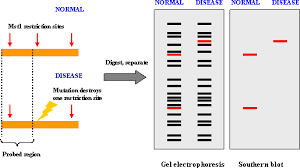
Variable number of tandem repeats (VNTRs) are repeating DNA sequences where the number of repeats varies among individuals.

Copy number variants (CNVs) refer to differences in the number of copies of a particular DNA segment found in different individuals.

Short Tandem Repeats (STRs) are repeating DNA sequences that exhibit variable numbers of repeats among individuals.
However, these are not the only types of markers; various other forms of genetic markers exist, and scientists are constantly discovering newer types.
An RSID (Reference SNP-cluster IDentification) is a distinctive identifier designated for single nucleotide polymorphisms (SNPs) within the dbSNP database.
Moreover, they identify short nucleotide insertions, deletions, and short tandem repeats.
Researchers and databases employ RSIDs to monitor and analyze genetic variations.
RSIDs follow the format "rs##"—for example, rs429358 links to Alzheimer’s risk.
Genetic markers influence traits by altering gene function or regulation. It’s essential to understand that most traits are polygenic; this means they are affected by multiple genes and numerous genetic markers.
A single marker rarely dictates a trait.
The combination of markers inherited from both parents creates a unique genetic profile that contributes to a trait's overall expression.
This genetic influence extends across various aspects of life, from physical traits like hair and eye color to health predispositions and wellness traits.
Genetic markers also play a crucial role in ancestry tracing and paternity testing, helping us understand our roots and biological relationships.
Hair Color: A gene called MC1R produces pigments in the body that regulate our skin, hair, and eye color. Research has identified a variant in the gene named rs1805007 linked to a higher chance of developing red hair.
Lactose Intolerance: We're born with the ability to digest lactose but lose it with time due to a variation in the gene that produces lactase, which digests lactose. While the extent of it varies, the variant changes the genes, which leads to little or no lactase enzyme production.
Body weight: We humans share the same basic genetic makeup; however, gene variations can influence individual traits, including body weight. Specific gene variants can affect metabolism, appetite regulation, and how the body stores fat, predisposing some individuals to weight gain or obesity.
Physical Performance: Genetic factors also influence endurance and other athletic abilities. Specific gene variants may contribute to greater aerobic capacity, muscle efficiency, and recovery, potentially enhancing an individual's endurance levels.
Several gene variants have links to improved physical strength and performance, including ACTN3, PPARA, and AMPD1.
These variants influence muscle fiber composition, energy metabolism, and recovery efficiency.
Genetic testing helps assess disease risks and personalize healthcare, but markers only indicate susceptibility, not certainty. Environment and lifestyle also play a significant role in health outcomes.
Cancer: While lifestyle and environmental factors play a significant role, certain genetic markers can indicate a higher susceptibility to specific cancers. For instance, BRCA1 and BRCA2 markers signal a higher risk of developing breast cancer and ovarian cancer.
Drug Response: Our bodies process medications differently; genetic markers can reveal these variations. Specific gene variants can affect how effectively our bodies metabolize certain drugs, influencing their efficacy and potential side effects.
For example, variations in the CYP2C19 gene can alter how the body processes certain antidepressants, allowing healthcare providers to tailor prescriptions for optimal treatment outcomes.
Markers are key in tracing genetic lineage and verifying biological relationships.
Ancestry Tests: Genetic markers are used to trace ancestral origins and migration patterns. Specific markers can reveal a person's ethnic background and geographic origins, connecting them to populations around the world. For instance, a marker on chromosome 15 might link someone to Indigenous American heritage, providing a deeper understanding of their ancestral roots.
Paternity Tests: Genetic markers, specifically Short Tandem Repeats (STRs), are used in paternity tests to confirm biological relationships accurately. These markers are highly variable between individuals, making them ideal for identifying parent-child relationships.
For example, DYS391 on the Y chromosome helps confirm biological parentage with high accuracy, offering clarity in questions of lineage.
Genetic markers function as essential indicators of genetic variations and can offer valuable insights into an individual's health and disease risk; however, they possess limitations.
Three categories of DNA markers exist: autosomal, paternal, and maternal.
Autosomal markers: These unique DNA sequences, scattered across the genome and not sex-specific, assess overall ancestry.
Paternal (Y-DNA) markers: Located on the Y-chromosome, fathers pass these markers down to their sons. Y-DNA markers trace paternal lineages.
Maternal (mtDNA) markers: These DNA markers, located in the mitochondria, are inherited from the mother. Mitochondrial DNA markers trace maternal lineages.
Siblings share approximately 50% of their genetic markers (inherited randomly from their parents). However, this percentage can fluctuate due to various factors. Although the genetic contribution is significant, it is essential to remember that siblings are still distinct individuals. This uniqueness arises because of the random assortment of genes during reproduction.
Yes, offspring can inherit genetic markers from their parents via Mendelian inheritance.
That’s why families often share traits like height or diabetes risk.
Genetic markers play a crucial role in diagnosing numerous diseases or assessing the risk of their development.
Diagnostic Testing: A specific genetic marker can definitively confirm a diagnosis in certain cases. For example, a particular mutation in the CFTR gene confirms cystic fibrosis.
Risk Assessment: Genetic markers commonly assess disease risk. They can indicate an elevated risk for a disease but do not guarantee that an individual will develop the condition. Environmental factors, lifestyle choices, and other genes significantly influence disease development.
Some diseases for which genetic markers are used include:
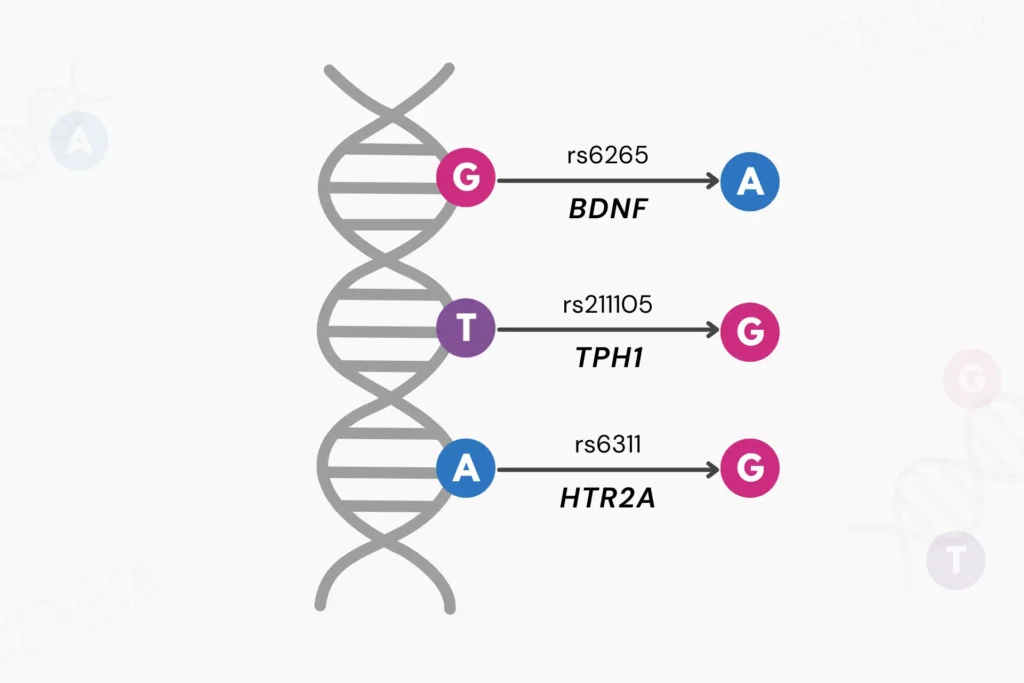
What Are RSIDs?
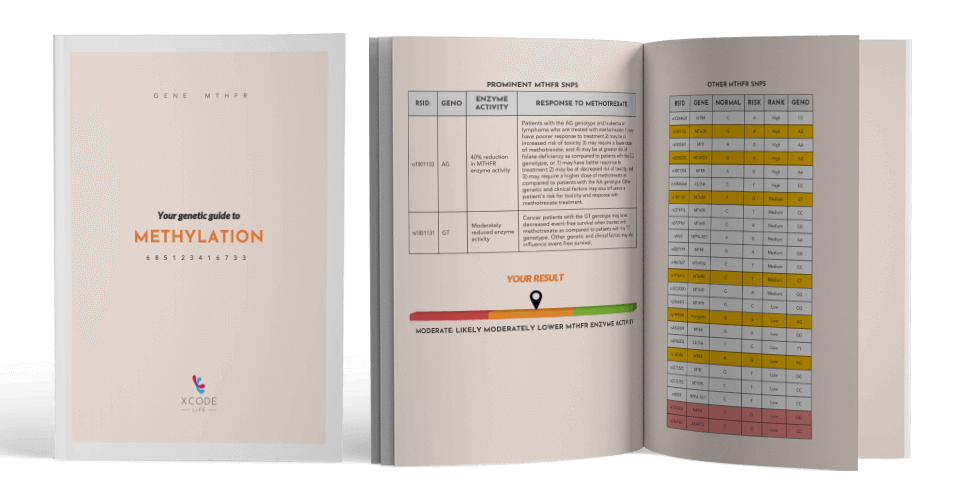
Genetic Methylation Test In 2025: The Where, How, & Why

How Genes Influence Your Risk For Lactose Intolerance
https://humangenetics.medicine.uiowa.edu/resources/how-does-genetic-testing-work
https://www.genome.gov/genetics-glossary/Genetic-Marker
https://my.clevelandclinic.org/health/diagnostics/23065-dna-test--genetic-testing
https://medlineplus.gov/genetics/understanding/testing/riskslimitations